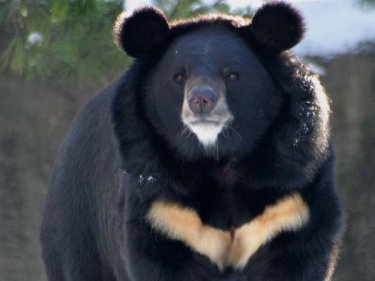
The heat was oppressive as I clambered through the dense, steaming jungle. I had arrived at the Kung Si Falls, just a 40 minute tuk tuk ride from the bustling capital city of Laos, Luang Prabang. After paying a modest entry fee, I followed a twisting path through the trees, stepping over crumbling rocks and tree-roots the size of anacondas. As I walked along the trail, excited to see the famous waterfalls, I discovered I was surrounded by huge fenced off enclosures with hammocks, tree houses and streams running through them. Curiosity pulled me closer. Peering through the fence I saw fuzzy, friendly-looking creatures with light brown muzzles and bright little eyes peeping through their fur… Asiatic Black Bears! They had a slow, laid-back nature, and seemed happy and content in their surroundings. Some were lounging around in hammocks, others lazily splashing in the cool fresh-water streams, or climbing up man-made tree houses. As I watched the animals in delight I got talking to Sarah, a lovely enthusiastic volunteer, who told me all about the sanctuary.
The sanctuary is part of the Free the Bears Fund, a charity that provides support to a wide range of projects across Asia. The rescued bears at the sanctuary had been saved from a number of horrific situations; some were kept as “pets” in terrible conditions, others were found in traps that poachers had left out, and many were rescued from the bear bile industry. Sarah’s passion for the animals shone through, as she passionately told me about some of the bears’ individual personality traits. There was Kobi, a 3 legged male who lost a leg in a trap, but didn’t let his disability interfere with his love life. In fact, he was so wildly popular with the females he had to be separated from them, as they were driven wild with lust in his presence! There was Lyna, a shy older bear overcoming anxiety and agoraphobia after years of being kept alone in a tiny cage. I was even allowed access into the staff-only area to meet the orphaned cubs, who’s boisterous and playful nature was particularly endearing. Sarah explained to me that sadly the majority of the bears would not be able to be released back into the wild because of their familiarity with humans; the danger of them wondering back into villages was all too much to risk.
The main threat to bears in Laos, and indeed in many part of Asia, is the horrific bear bile industry. It is estimated that 12,000 bears are farmed for bile inChina,South Korea,Laos, Vietnam, andMyanmar. The digestive fluid produced in their livers has been used in traditional Asian medicine for thousands of years, and is known to be useful for treating liver and gall bladder conditions. Though there are now many readily available synthetic alternatives with the same medicinal properties, lack of education and the desire to uphold traditional practice means the bear bile industry is still very much thriving. Taking bears from the wild is obviously detrimental to the wild population of bears, but the other pressing issue is the amount of unnecessary pain and cruelty associated with bear bile farms. Bears are kept in tiny cages which are often too small for them to turn around in. Most of the bears will spend their entire lives, (up to 30 years) in these cages, until they die of starvation, dehydration, disease or malignant tumors. Typically, bear bile is extracted through crude methods, such as a metal rod which is jammed directly into the liver. More often than not, these wounds are left untreated. It’s hard to imagine the agony of a metal rod repeatedly slitting open your old, infected wound, never allowing you to have time to heal. All this, spent in a tiny, dirty, isolated cage. I know that this is extremely upsetting to think about, but it is the reality of life for many bears across Asia.
Luckily, there are ways you can help this situation. If you fancy a rewarding, life changing trip, you can volunteer at the Cambodia Free The Bears Sanctuary. Not only will this give you a once in a lifetime opportunity to work behind the scenes with these incredible animals, you will also be making a tangible difference. For more information, or to apply for this, contact Free the Bears at This email address is being protected from spambots. You need JavaScript enabled to view it.. Alternatively you can donate, become a member or sponsor a bear. To do any of this visit their website at www.freethebears.org.
